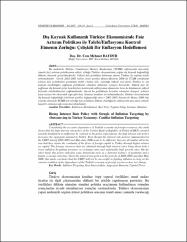| dc.contributor.author | Baydur, Cem Mehmet | |
| dc.date.accessioned | 2020-11-20T17:33:06Z | |
| dc.date.available | 2020-11-20T17:33:06Z | |
| dc.date.issued | 2007 | |
| dc.identifier.issn | 1302-0064 | |
| dc.identifier.issn | 2458-8253 | |
| dc.identifier.uri | https://app.trdizin.gov.tr//makale/TnpZNE5qUTA | |
| dc.identifier.uri | https://hdl.handle.net/20.500.12809/7875 | |
| dc.description.abstract | Bu makalede Türkiye Cumhuriyet Merkez Bankasının (TCMB) enflasyonla mücadele etmede faiz artırım politikasının etkisiz olduğu Türkiye ekonomisinin yoğun dış kaynak bağımlılığı dikkate alınarak gösterilmektedir. Yüksek faiz politikası bilinenin aksine Türkiye’de toplam talebi arttırmaktadır. Gerek 2002-2005 yılları arası gerekse Mayıs-Haziran 2006’da TCMB tarafından izlenen faiz politikaları görünüşte farklı olsalar bile, yarattığı yüksek reel faizle Türkiye’ye dış kaynak sürekliliğini sağlayan politikalar olmaları itibariyle sonuçta benzerdir. Yüksek faiz ile sağlanan dış kaynak girişi hem kurları bastırarak enflasyonun düşmesine hem de büyümenin yüksek hızlarda sürdürülmesini sağlamaktadır. Ancak bu politikanın bozulan ödemeler dengesi, şoklara karşı hassas bir ekonomik yapı gibi bazı olumsuz tarafları da bulunmaktadır. Türkiye ekonomisinin dış kaynak bağımlılığı belirleyen şartlar değişmediği sürece 2002-2005 dönemi ile Mayıs 2006’dan sonraki dönemde TCMB’nin izlediği faiz politikası dikkate alındığında enflasyonla mücadele etmede başarılı olamayacağı sonucuna ulaşılmıştır. | en_US |
| dc.description.abstract | Considering the excessive dependence of Turkish economy on foreign resources, this study shows that the high interest rate policy of the Central Bank of Republic of Turkey (CBRT) oriented towards disinflation is inefficient. In contrast to the policy expectations, the high interest rate policy increases the aggregate demand in Turkey. Even though the interest rate policies implemented by the CBRT during 2002-2005 and May-June 2006 seem to be different, they are all similar all in the way that they ensure the continuity of the flows of foreign capital to Turkey through higher returns on capital. The foreign resources that are obtained through high interest rates bring about both a lower inflation by putting pressure on exchange rates and sustainable high growth rates. On the other hand, this policy embodies some drawbacks such as a distorted balance of payments and a fragile economic structure. Given the interest rate policy in the periods of 2002-2005 and after May 2006, this study concludes that the CBRT will not be successful in fighting inflation so long as the current condition of the dependence of the Turkish economy on foreign resources does not change. | en_US |
| dc.item-language.iso | tur | en_US |
| dc.item-rights | info:eu-repo/semantics/openAccess | en_US |
| dc.subject | Davranış Bilimleri | en_US |
| dc.subject | İş | en_US |
| dc.subject | İşletme Finans | en_US |
| dc.subject | İktisat | en_US |
| dc.subject | Otelcilik, Konaklama, Spor ve Turizm | en_US |
| dc.subject | Hukuk | en_US |
| dc.subject | İşletme | en_US |
| dc.subject | Siyasi Bilimler | en_US |
| dc.subject | Kamu Yönetimi | en_US |
| dc.subject | Halkla İlişkiler | en_US |
| dc.subject | Kadın Araştırmaları | en_US |
| dc.title | Dış Kaynak Kullanımlı Türkiye Ekonomisinde Faiz Artırım Politikası ile Talebi/Enflasyonu Kontrol Etmenin Zorluğu: Çelişkili Bir Enflasyon Hedeflemesi | en_US |
| dc.item-title.alternative | Rising Interest Rate Policy with Strugle of Inflation Targeting by Outsourcing in Turkey Economy: Conflict Inflation Targeting | en_US |
| dc.item-type | article | en_US |
| dc.contributor.department | MÜ, İktisadi Ve İdari Bilimler Fakültesi, İktisat Bölümü | en_US |
| dc.contributor.institutionauthor | Baydur, Cem Mehmet | |
| dc.identifier.volume | 14 | en_US |
| dc.identifier.issue | 2 | en_US |
| dc.identifier.startpage | 93 | en_US |
| dc.identifier.endpage | 102 | en_US |
| dc.relation.journal | Yönetim ve Ekonomi: Celal Bayar Üniversitesi İktisadi ve İdari Bilimler Fakültesi Dergisi | en_US |
| dc.relation.publicationcategory | Makale - Ulusal Hakemli Dergi - Kurum Öğretim Eleman | en_US |


















